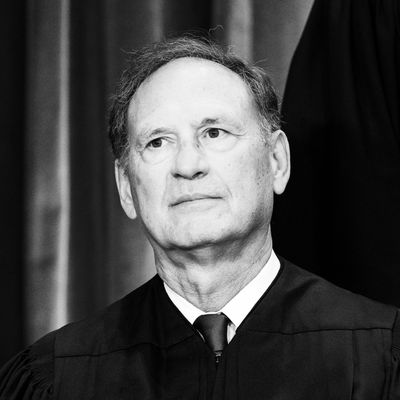
That the Supreme Court seems poised to overturn Roe v. Wade, according to an opinion draft leaked to Politico, is horrifying in and of itself. But some of the outright lies and misleading arguments used to justify this decision further twist the knife, adding another layer of cruelty to a decision that could immediately strip women in 25 states of basic agency over their bodies.
The draft opinion was signed by Justice Samuel Alito, and according to Politico, four other conservatives on the Supreme Court have already voted in support of nixing federal protections for abortion. While the justices can still amend the opinion or change their minds entirely in the coming months, the leak portends a dire future for abortion rights. Here are some of the most egregious passages:
“The Constitution makes no reference to abortion, and no such right is implicitly protected by any constitutional provision.”
The centerpiece of Alito’s argument is that since abortion is not enshrined in an 18th-century document, it should not be protected by modern law. Do you know what else isn’t in the Constitution? Women’s rights of any kind. As others have pointed out, this logic presents a slippery slope for rulings that protect progress on other social issues like same-sex or interracial marriage. According to Alito, “a right exists only if it has been recognized for generations,” as one civil rights lawyer wrote on Twitter. “No room for constitutional change to match a more tolerant and enlightened society.” On a more technical level, this rationale ignores the fact that the Court has made plenty of allowances for rights that aren’t, in Alito’s words, “deeply rooted in the Nation’s history and traditions,” and that abortion was actually legal in the U.S. when the Constitution was signed.
“Two treatises by Sir Matthew Hale likewise described abortion of a quick child who died in the womb as a ‘great crime’ and a ‘great misprision.’”
Here’s a fun one: To bolster his case, Alito leans on one Sir Matthew Hale, a 17th-century English jurist who was no fan of abortion but who did support martial rape, which was still legal in some states up until the early 1990s. The draft opinion quotes from The History of the Pleas of the Crown, a text in which Hale writes: “For the husband cannot be guilty of a rape committed by himself upon his lawful wife for by their mutual matrimonial consent and contract the wife hath given up herself in this kind unto her husband which she cannot retract.” And that’s not all: Hale had two women executed for practicing “witchcraft” and believed in capital punishment for teenagers.
“A highly disproportionate percentage of aborted fetuses are black.”
In one of the most inflammatory and distracting footnotes, Alito links early abortion rights advocates to the eugenics movement, weaponizing race to help dismantle a ruling that actually protects vulnerable women. “It is beyond dispute that Roe has had that demographic effect,” he writes. “Some such supporters have been motivated by a desire to suppress the size of the African American population.” While it’s true that Black women have the highest abortion rate, this statistic doesn’t take into account the results of systemic racism that contribute to this statistic, like poverty or unemployment, nor the fact that stripping this group of their bodily autonomy isn’t a solution to these underlying issues. It also ignores the fact that when giving birth, Black mothers face severe discrimination: Their maternal mortality rate is three times that of white women, and in some states, it’s much more dangerous to give birth than to have an abortion, especially for those in vulnerable groups.
Claims that “leave for pregnancy and childbirth are now guaranteed by law in many cases” and that “the costs of medical care associated with pregnancy are covered…”
In this passage, Alito regurgitates some pretty dubious anti-abortion myths that paint modern motherhood as a state-supported utopia. The reality is anything but: The opinion draft touts the guarantee of family leave, yet the U.S. is the only wealthy country in the world without a mandated national program, and almost 80 percent of new parents have no paid time off. If the costs of childbirth were covered, as Alito claims, a vaginal delivery wouldn’t cost as much as $11,000 (that’s with insurance), or $15,000 for C-sections.
“States have increasingly adopted ‘safe haven’ laws, which generally allow women to drop off babies anonymously…”
The idea that the existence of safe haven laws and adoption means mothers have “little reason to fear that the baby will not find a suitable home” if they carry an unwanted pregnancy to term is grossly oversimplified. “They make it sound like this is an easy switch that women are making,” Gretchen Sisson, a sociologist who studies abortion and adoption, told my colleague Irin Carmon last year regarding the anti-abortion movement’s support for adoption. “I have encountered almost no women who are choosing between those two things and weighing one against the other.” Safe haven laws, which are rarely used, exist as a last resort, while adoption is an emotionally complex process that can be both costly and discriminatory. Even if a woman did choose to give up a child, Alito elides the physical and psychological toll. “People don’t just drop a child off and go on with their lives,” Anthony Michael Kreis, an assistant professor of law at Georgia State University, told the 19th.
“Women are not without electoral or political power.”
According to Alito, it’s no big deal that the opinions of five conservative justices can trample all over a basic human right, since on a state level, women can now “seek to affect the legislative process by influencing public opinion, lobbying legislators, voting and running for office.” Democracy! But any argument that paints the U.S. political system as a bastion of equality is made in bad faith: Women make up less than a third of all state legislators, and a similar gender gap appears in other levels of office. The idea that voting rights is a salve is especially rich coming from Alito, a man who has worked to erode them in two separate decisions and helped block efforts to stop gerrymandering. It will be hard to fight anti-abortion laws on a state level when the system is rigged to keep white, Republican men in power.
“Roe and Casey have enflamed debate and deepened division.”
There’s a lot to chew on here. In this passage, Alito blames two rulings that have given women control over their bodies, Roe v. Wade and Planned Parenthood v. Casey, for sparking “a national controversy that has embittered our political culture for a half-century.” Hmm. Some might argue the real “controversy” stems from the fact that male politicians and a fervent religious right have had outsize control over reproductive rights, despite the fact that the majority of Americans think the Roe decision should be upheld. Also adding to this deep “division” might be the fact that men like Alito have turned health care and the right to choose into a moral lightning rod, forcing women to compromise their own safety and autonomy in the name of “family values.” If Alito thinks overturning Roe will unite these warring factions, he must really be living under a rock.
More on life after roe
- Trump Teases a New Era of Anti-Abortion Violence
- Trump’s Sneaky Opening Attack on Abortion Rights
- Trump 2.0 Won’t Stop People From Telling Their Abortion Stories


